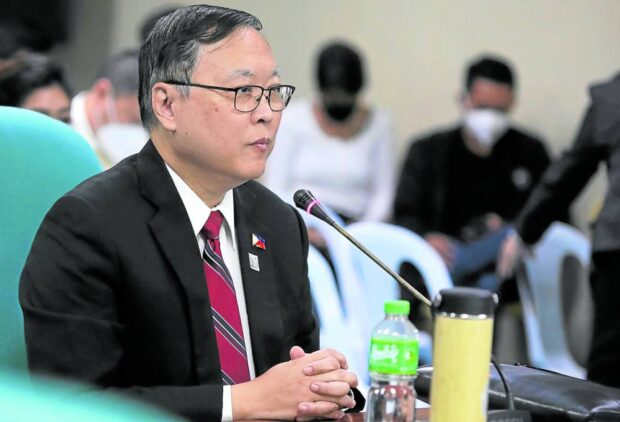
Information and Communications Technology Secretary Ivan John Uy. Senate PRIB file photo
Information and Communications Technology Secretary John Ivan Uy on Wednesday justified his agency’s request for P300 million in confidential funds under the proposed 2024 national budget, saying these would be used to go after online and text scammers who continue to victimize Filipinos.
“Our hands are tied if we do not have this kind of capability. There are many ways used by these scammers in order to avoid detection and to avoid capture or arrest. And we need all the resources possible and all the tools possible in order to go after them. So, the confidential fund is essential in order to conduct intelligence and investigation in order to go after these criminals,” Uy said in a Palace briefing.
He said the Department of Information and Communications Technology (DICT) did not have confidential funds this year, but had P400 million of such money in the previous year.
Uy noted that cybercriminals have become “very well-funded, very well-organized, and very highly technical.”
“We should be able to match this with an equal might of the government to go after them and our hands are tied if we do not have the proper tools. And many of these tools and many of these methodologies require confidential funds to do,” he pointed out.
The DICT chief cited as an example the spam and text message scams that many mobile phone subscribers continue to receive even after the enactment of the SIM (subscribers identity module) Registration Act.
Uy said that compared to the preregistration period, there have been fewer text message scams being reported.
However, he said syndicates were able to continue their nefarious activities by using other platforms such as instant messaging applications and email, some of which require mobile phone numbers that scammers can target.
The DICT chief said that scams were still prevalent as cyber hackers exploit platforms such as Telegram and Viber.
Typical scams include baits such as too-good-to-be-true job offers and fake lottery winnings.
Jocel de Guzman, cofounder and co-lead convener of Scam Watch Pilipinas, said in the same briefing that many Filipinos fall victim to fraudulent activities due to a lack of digital literacy.
The head of the advocacy group advised Filipinos to be more discerning of messages, especially those carrying suspicious links.
There were also cases wherein syndicates were able to buy preregistered SIM cards or obtained registered SIM cards using fake IDs, according to Uy.
He noted that cyberhackers were mining personal information and photos in social media to build fake credentials for an ID.
The official reminded Filipinos to be cautious when posting on social media and avoid sharing personal and private information that could be used against the users.
“Not everyone who views your social media account is a friend,” he said.
Such fake IDs, unfortunately, were accepted by SIM registration portals based on the recent findings by the National Bureau of Investigation, which it presented during a Senate hearing last week.
Validation program
According to the SIM registration law, individuals guilty of registering using fictitious or fraudulent IDs can be penalized with imprisonment of six months to two years or a fine of P100,000 to P300,000, or both.
“We are going to deploy some corrective measures in order to (weed) out these fake identities,” Uy vowed.
The National Telecommunications Commission (NTC) previously told the Inquirer that a memorandum order for post-registration validation guidelines was scheduled to be released this week.
Last week, the NTC and other stakeholders held a technical working group meeting to iron out its implementing rules and regulations.
“In the next few months, we’ll be cleaning up those records together with the telcos,” he added.
To prevent mass registration of SIM cards—which are potentially done with fake IDs—Uy said they were looking into limiting the number of SIM card ownership per person.
For example, he said a person could register just three to four SIM cards since the country has only three telco players.
But this proposed policy will not be applied to corporate entities, which provide mobile phones to many employees.
“Let’s study it well. For now, it is one of the recommendations,” he said.
Multiple SIM card ownership was understandable, Uy said, given that mobile signal varies in each location.
READ: Text scams decline due to SIM card registration law — DICT